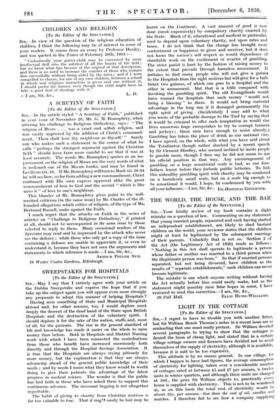SWEEPSTAKES FOR HOSPITALS
[To the Editor of the SPECTATOR.]
SIR,—May I say that I entirely agree with your article on the Dublin Sweepstake and express the hope that if you take up the subject again you will oppose even more strongly any proposals to adopt this manner of helping Hospitals ? Having seen something of State and Municipal 'Hospitals abroad and, for other reasons, too, I would deplore most deeply the descent of the dead hand of the State upon British Hospitals and the destruction of the voluntary spirit. I should deplore it for the sake of the nation, staffs,and, most of all, for the patients. The rise in the general standard of life and knowledge has made it easier on the whole to raise money than before. Both in Hospitals and District Nursing work with which I have been connected the contributions from those who benefit have increased enormously both directly and through the Hospital Savings Association. It is true that the Hospitals are always crying pitiously for more money, but the explanation is that they are always advancing ahead of the general public knowledge of their needs ; and by needs I mean what they know would be worth doing to give their patients the advantage of the latest progress in medical science. The wonder is that the public has had faith in those who have asked them to support this continuous advance. The incessant begging is not altogether regrettable.
The habit of giving to charity from Christian motives is far too valuable to tote. That it mig:11 easily be lost may be
learnt on the Continent. A vast amount of good is now done (most expensively) by compulsory charity exacted by the State. Much of it, educational and medical in particular, used to depend upon voluntary charity, not upon rates and taxes. I do not think that the change has brought more contentment or happiness to giver and receiver, but it does not harm the nation's self respect as would dependence of charitable work on the excitement or avarice of gambling. The strict purist is hurt by the fashion of raising money to the extent that prevails through harmless amusement. It irritates to fmd many people who will not give a guinea to the Hospitals from the right motives but will give for a ball- ticket two guineas, of which one goes to a hospital and the other in amusement. But that is a trifle compared with invoking the gambling spirit. The old Evangelicals would have warned the hospitals that such money " would not bring a blessing " to them. It would not bring material advantage in the long run if it damaged permanently the right spirit of giving. (Incidentally I may add to what you wrote of the probable damage to the Turf by saying that it would be criminal to offer such temptation as would rise from numerous huge sweepstakes to try to corrupt trainers and jockeys ; these men have enough to resist already.) Gambling has taken the place of drink as our national vice. I have agreed, on the whole, with what you have said about the Totalizator, though rather shocked by a recent speech by Sir Clement Hindley, who seemed inclined to incite people to gamble more, though I dare say he did not mean to use his official position in that way. Any encouragement of gambling on a huge sensational scale is bad, as our fore- fathers learnt before they forbade public lotteries. To link this unhealthy gambling spirit with charity may be condoned on a harmlessly small scale, but on a scale big enough to be sensational it would, I hope, be condemned by you with all your influence.—I am, Sir, &c., .y-axss
0SPITAL GOVERNOR.


























































 Previous page
Previous page